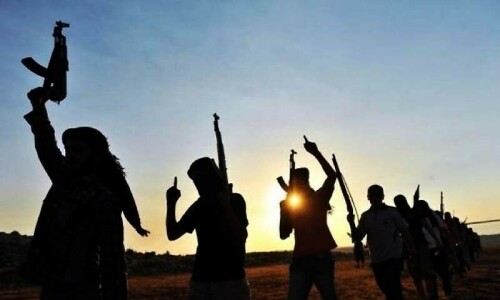KHARTOUM: Fresh protests against bread price hikes in Sudan hit two cities on Sunday, as riot police ensured an uneasy calm in the capital Khartoum five days into demonstrations that have claimed at least eight lives.
Residents in Um Rawaba, 200 kilometres southwest of Khartoum, said that some 600 people gathered in the market chanting the slogan “the people want the fall of the regime”.
Protesters burnt tyres and branches in the streets and attempted to storm a government building before being rebuffed by security officials, witnesses said.
In Atabara, 300 kilometres northeast of the capital, riot police and plain-clothed operatives deployed tear gas against hundreds of protesters, a witness said.
A wave of unrest has rocked Sudan since Wednesday after the government hiked the price of a loaf of bread from one Sudanese pound to three (from about two to six US cents).
Clashes with riot police killed at least eight people, according to official figures.
A higher death toll of 22 has been given by Sudan’s main opposition leader Sadiq al-Mahdi, who blamed “armed repression” for the casualties.
There was a tense calm in the streets of Khartoum on Sunday as schools and universities were shuttered and riot police equipped with batons and tear gas guarded buildings.
Frustrated Sudanese queued outside bakeries in the city, where vendors were refusing to sell more than 20 loaves of bread per person.
“I have a big family and this bread is not enough for three daily meals,” a local resident said.
A bakery worker said a security guard standing nearby was not allowing the shop to sell any more.
Sudan’s official news agency SUNA reported on Sunday that authorities had arrested a “cell of saboteurs” that planned “acts of vandalism in the capital”.
The official outlet said the “cell” includes members opposition groups, but did not elaborate.
Sadiq Youssef from the opposition coalition, National Consensus Forces alliance, had said earlier that 14 members of his group, including its president Farouk Abu Issa, were arrested as they left a meeting.
A group bringing together representatives of different professions called in a statement on Sunday for a series of strikes over the price rise, starting with hospitals from Monday.
Sudan is mired in economic difficulties including an acute foreign currency shortage and soaring inflation.
Demonstrations broke out in January over the rising cost of food, but they were soon brought under control with the arrest of opposition leaders and activists.
Published in Dawn, December 24th, 2018














































Dear visitor, the comments section is undergoing an overhaul and will return soon.